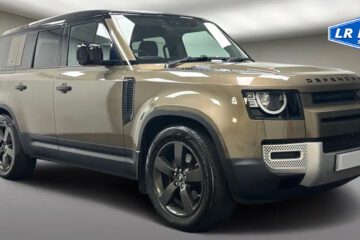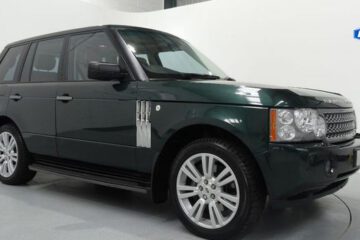Introduction
Regarding the evolution of British luxury off-road vehicles, Range Rover engine comparison discussions often inspire enthusiasts. From the raw mechanical simplicity of the Range Rover Classic’s 3.5L V8 engine to the technologically latest Range Rover Vogue’s 3.0L powerhouse, the journey of powertrain evolution explains an impressive story. The Range Rover petrol and diesel engines have developed impressively over the decades, with performance expectations changing alongside technological advancements. These changes show Range Rover’s commitment to merging tradition with innovation, showing their ability to adjust while staying true to the brand’s legacy.
The Beginning of Luxury Off-Road Performance
In 1970, the Range Rover Classic was introduced with the famous Range Rover Classic 3.5L V8 engine. This engine was based on the Buick 215 block but heavily adjusted by Rover engineers to fit the emerging demands of a capable but comfortable off-road vehicle. It generates around 130 horsepower, modest by today’s standards but revolutionary for its time. The petrol version of the 3.5L V8 brought a silky smoothness rarely associated with reliable utility vehicles.
Meanwhile, diesel engines were not important in the early Range Rover lineup. Diesel variants only appeared in later iterations of the Classic period, but the petrol-powered 3.5L V8 remains the heart and soul of the original Range Rover identity. While assessing a Range Rover engine comparison, the focus was on versatility and basic luxury, rather than outright performance or the latest technology.
The 3.5L V8 Engine – A Testament to Simplicity
One of the major appeals of the Range Rover Classic 3.5L V8 engine was its mechanical simplicity. It had a basic carbureted setup that made maintenance relatively simple. With fewer electronics, identifying issues was often a matter of common sense rather than computer diagnostics. This straightforwardness remains a powerful point of discussion whenever a Range Rover engine comparison is conducted between classic and modern models.
The 3.5L V8 petrol variant wasn’t just raw speed. It offered a smooth, torquey delivery that was excellent for off-roading and long-distance cruising. Diesel models that appeared later in the Classic’s lifecycle, like the VM Motori-sourced 2.4L and 2.5L diesel engines, were adequate but not especially noteworthy in performance.
Technological Advances in the Modern Era: The Vogue 3.0L Engine
Fast forward to the 21st century, and the Range Rover Vogue emerges as a hallmark of what luxury SUVs can achieve. At the core of the new Vogue models is the Range Rover Vogue 3.0 engine, available in both the latest petrol and diesel variants. Here, the Range Rover engine comparison takes a noticeable turn toward complexity, efficiency, and performance.
The Range Rover 3.0L engines in the Vogue models are a true wonder of engineering. Available in various iterations, including a turbocharged petrol inline-six with mild-hybrid technology and a twin-turbo diesel V6, they reflect a complete shift in design philosophy compared to the old 3.5L V8. Modern Range Rover engines emphasize performance, fuel economy, emissions, and refinement.
Performance Comparison: Power and Torque
In terms of vast numbers, the Range Rover Vogue 3.0 engine leaves the old 3.5L V8 far behind. The petrol 3.0L inline-six produces approximately 395 horsepower, nearly triple the output of the Classic V8. Torque numbers are similarly superior, with modern engines generating over 550 Nm compared to the modest 251 Nm from the 3.5L V8.
Diesel variants have also evolved significantly. Modern 3.0L diesel engines in the Vogue series generate upwards of 300 horsepower and deliver enough torque figures well over 600 Nm, guaranteeing both brisk acceleration and superb towing capabilities. In any serious Range Rover engine comparison, these numbers show how much technology has enhanced performance expectations.
Fuel Economy and Emissions
One of the vital factors driving the evolution of Range Rover engines is the need to meet stringent emissions rules and enhance fuel efficiency. The Range Rover Classic 3.5L V8 engine, while beloved, was a notorious gas guzzler. Early petrol variants barely managed 12-14 miles per gallon under mixed driving conditions. Diesel versions that appeared later marginally boosted fuel economy, but often at the expense of performance.
Today’s Range Rover Vogue 3.0 engine includes advanced fuel-saving technologies such as mild hybrid systems, automatic start/stop, and intelligent energy recuperation systems. Modern petrol variants can reach upwards of 25 mpg, while diesel engines can stretch even further, offering ranges previously unheard of in vehicles of such size and luxury.
Reliability and Maintenance
When assessing the Range Rover engine comparison, it’s essential to consider maintenance demands. The Range Rover Classic 3.5L V8 engine excels in this category due to its simplicity. With fewer units to fail, the V8 could be kept running indefinitely with basic mechanical skills and a few hand tools. However, rust, outdated materials, and a lack of the latest engine management did cause other problems over time.
The modern Range Rover Vogue 3.0 engine, with its turbochargers, intercoolers, emission control devices, and complex electronics, demands a more advanced maintenance regime. Regular servicing at specialized centers is vital to guarantee longevity. Diesel variants, especially, require meticulous maintenance to prevent issues such as DPF clogging and turbo failures. While reliability has vastly enhanced, the price and complexity of repairs have risen proportionally.
The Emotional Factor: Then vs Now
Nostalgia plays a main role while discussing the Range Rover engine comparison between the Classic 3.5L V8 and the modern Vogue 3.0 engines. Driving the Classic feels like navigating a chapter of history. Every vibration, every mechanical noise reminds you that you’re operating something designed with a hands-on approach to automotive engineering.
In comparison, piloting a modern Range Rover Vogue feels almost smooth. The sense of occasion is different, you are cosseted in technology, shielded from the elements, and separated from mechanical rawness. Petrol variants deliver a nearly silent surge of power, while diesel variants provide smooth torque, perfect for long-distance cruising or handling rugged terrain.
Which Is Better: Classic or Modern?
Finally, the answer relies on what you value more. If you are looking for a direct, visceral connection with your vehicle, where every drive feels like an event, the Range Rover Classic 3.5L V8 engine holds an unbeatable charm. For those who value comfort, technology, performance, and environmental responsibility, the Range Rover Vogue 3.0 engine offers a package that’s difficult to surpass.
Petrol versions deliver a more emotional, spirited driving experience, while diesel variants in both generations offer practical benefits such as superior fuel economy and towing capability. Modern engines bring a breadth of capability during the Classic era, but they also come with greater complexity and cost.
Conclusion:
The Range Rover engine comparison between the Classic 3.5L V8 and the Vogue 3.0 engines paints a clear picture of automotive progress. Both petrol and diesel variants have their specific strengths, capturing the spirit of their respective eras. The journey from the mechanically simple but charming 3.5L V8 to the technologically advanced and refined 3.0L engines is a prime example of Range Rover’s ability to evolve without losing its essence.
For those who admire history and authenticity, the Range Rover Classic remains an irreplaceable icon. For those who want the best that modern engineering can offer, the Range Rover Vogue stands tall as the apex of luxury SUVs. Even if you prefer the rumble of a carbureted V8 or the silky surge of a turbocharged six-cylinder, one truth remains: Range Rover continues to set the standards for what an off-road luxury vehicle can be.
If you’re eager about maintaining or upgrading your Range Rover, even if it’s the classic 3.5L V8 or the latest 3.0 engines, trust the experts at LR Engine Specialists. Their unmatched knowledge and dedication to excellence guarantee that your Range Rover continues to perform at its best, honoring both its storied past and its promising future.
FAQs:
How much horsepower does the Range Rover Classic 3.5L V8 engine produce?
The Range Rover Classic 3.5L V8 engine generates around 130 horsepower, a solid figure for its time but modest compared to modern engines.
What are the main differences between the Range Rover Classic 3.5L V8 and the Vogue 3.0 engine?
The Vogue 3.0 engine is more potent, offering up to 395 horsepower and boosted efficiency, while the Classic 3.5L V8 emphasizes simplicity and mechanical charm.
How does the fuel economy of the Range Rover Classic compare to the Vogue 3.0?
The Classic 3.5L V8 was a fuel guzzler, achieving approximately 12-14 mpg, while the Vogue 3.0 engine can achieve 25 mpg or more due to the latest fuel-saving technologies.
Is the Range Rover Classic 3.5L V8 engine reliable?
Yes, the 3.5L V8 engine is well-known for its mechanical simplicity and reliability, with minimal electronics making it easier to maintain with basic tools.
Which engine is better for off-roading, the Classic 3.5L V8 or the Vogue 3.0?
The Classic 3.5L V8 offers a raw, off-roading experience, while the Vogue 3.0 provides superior performance, advancement, and technology, making it more capable overall.


